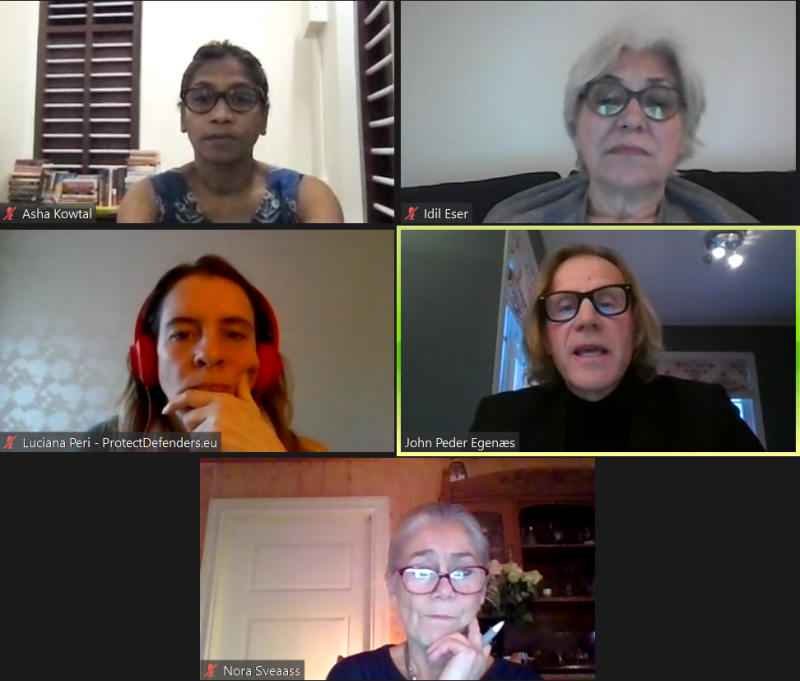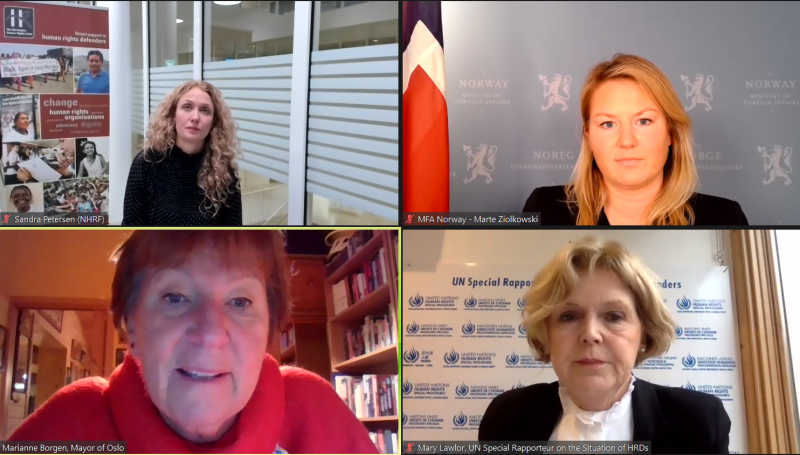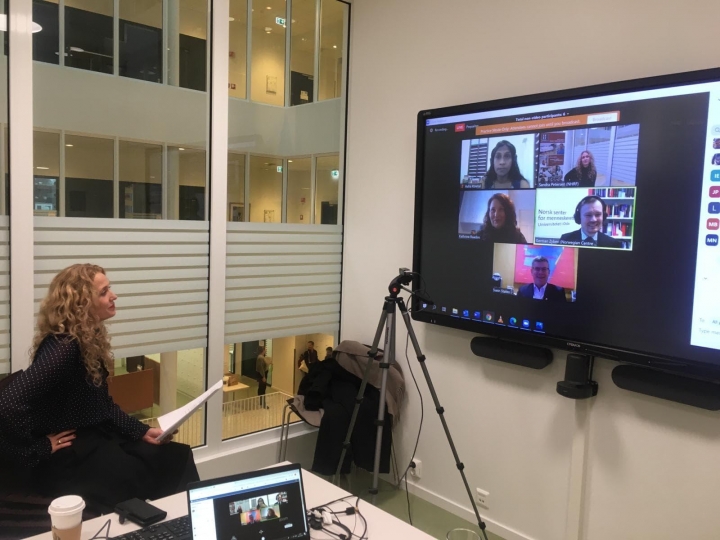"It is a great opportunity for us to bring together different organizations and see the work we have ahead of us. We need new allies to achieve our goals." Sandra Petersen, Executive Director of the NHRF.
The webinar opened with welcoming words from the Rector of the University of Oslo, Svein Stølen, talking about the University’s role in human rights work and its cooperation with the Scholars at Risk network. Facilitators Gentian Zyberi, Head of Department of the Norwegian Center for Human Rights, and Sandra Petersen, Executive Director of the NHRF, also gave a warm welcome and presented the panels. The first panel of the webinar was moderated by Professor Nora Sveaass, and focused on the current situation of human rights defenders and the need of defenders in the frontline to work safely, both physically and mentally. Asha Kowtal, Dalit and Woman Human Rights Defender from India, spoke about the importance of self-care. "Psychological care is a fundamental issue, because many within the movement suffer from stress that affects our minds". Kowtal pointed out that the months she spent at one of the Shelter Cities in the Netherlands helped her to refocus some of her actions. "When I returned to India, I started looking for programs in my country that would help defenders in different areas».
Human rights defenders at risk – the need of protection mechanisms
Idil Eser, former Executive Director of Amnesty International Turkey, shared her experience of being arrested by the Turkish government, and the subsequent persecution of foreign human rights organizations in Turkey. Following a workshop with fellow human rights defenders in 2017, she and nine other human rights defenders were arrested by the Turkish government and accused of aiding three different terrorist organizations. “Our case was a political trial that was supposed to send a message to all human rights defenders," said Eser. She came to Norway on an Amnesty grant and has been a guest researcher at the Norwegian Centre for Human Rights. She is facing imprisonment if she returns to Turkey. Now, she needs to figure out what to do in the next phase of her life. «I cannot go back to Turkey now because I would go back to prison and may never get out again. If I had stayed with Amnesty Turkey, I would have been some kind of a hostage for the government for everything I do”. She said she doesn't believe she will find work in non-governmental organizations in Turkey as it is too risky to employ her.

"I cannot go back to Turkey now because I would go back to prison and may never get out again. If I had stayed with Amnesty Turkey, I would have been some kind of a hostage for the government for everything I do”. Idil Eser, former Executive Director of Amnesty International Turkey
Following Kowtal and Eser’s testimonies, Luciana Peri, Coordinator of the Temporary Relocation Platform of ProtectDefenders.eu, spoke about the importance of going beyond sheltering and relocating defenders at risk: "Protection work is not only about relocating those who are at risk, but it is also important to pay attention to their conditions of vulnerability, as well as to have an intercultural team that helps us create more inclusive societies and incorporate local knowledge". Amnesty International Norway’s Director, John Peder Egenæs, also addressed the protection of human rights defenders, taking into account the worsening situation of persecution they face, coupled with the risks of working in the midst of a pandemic: “Opponents of human rights defenders are increasingly criminalizing the activities of defenders, and by criminalized I both mean to make it literally illegal to receive foreign funding, or criminalizing defenders in the public eye by calling them spies, traitors or even enemies of God”. Egenæs also emphasized the need to rethink the actions of organizations at such a polarized time, and to pay more attention to the needs of organizations in countries that are in the frontline of human rights advocacy: "We have been very busy talking, but not listening," said Egenæs.
The role of Norwegian and international support to human rights defenders
While the first panel discussed first-hand experiences with difficulties to conduct human rights work and protection mechanisms for defenders at risk, the second panel addressed the role of Norwegian and international support to human rights defenders. The panel, moderated by NHRF's Executive Director Sandra Petersen and consisting by UN Special Rapporteur on the Situation of Human Rights Defenders, Mary Lawlor, the State Secretary of the Ministry of Foreign Affairs, Marte Ziolkowski, and the Mayor of Oslo, Marianne Borgen, opened with video messages from human rights defenders with recommendations to Norwegian and international actors (watch the messages in the video above). UN Special Rapporteur Mary Lawlor spoke about how the situation for human rights defenders has radically changed during COVID-19, forcing many to move to digital platforms and thus being exposed to digital security issues, a topic addressed in the video by Nighat Dad from Digital Rights Foundation in Pakistan. Other issues due to COVID-19 are all the travel restrictions, as now those who want to harm them know where to find them – at home. She also expressed the need of more allies from civil society and governments, and emphasized how Norway and Norwegian embassies have offered important support to defenders for many years.

The State Secretary expressed her admiration for global human rights work and the concerns for shrinking space during the pandemic. She emphasized that it is even harder to monitor the human rights situation in this time than previously, and that women’s rights and sexual and reproductive rights is under even more pressure than before. Ziolkowski said that Norway’s role in the UN Security Council will seek to ensure that civil society and defenders are invited to brief the council, as well as that Norway will continue to be a consistent advocate for human rights in the years that come.
During the Mayor speech, she addressed how Oslo wants to be a city of peace, and that cities can make a difference and contribute in foreign policy issues, including issues involving human rights. She also mentioned that the municipality has looked into the possibility of Oslo becoming a shelter city to protect human rights defenders at risk, but explained that the pandemic has halted this discussion. The Mayor stated that she soon hope to further explore how Oslo and other cities can provide shelter and safety for human rights defenders around the world.
The webinar ended with concluding remarks from Kathrine Raadim, Director of the International Department at the Norwegian Centre for Human Rights, encouraging Norway to take the lead after the pandemic to clean up all the emergency laws and measures that has been imposed and hit human rights during the pandemic.
The Norwegian Centre for Human Rights and the Norwegian Human Rights Fund want to thank all the amazing participants for a great webinar exploring the pressing issues and possible solutions to the current human rights situation!
Watch the full webinar here:

